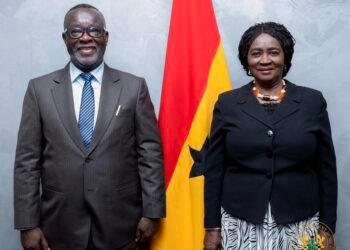A research by the COVID Transparency and Accountability Project (C-TAP) on Ghana has shown a possible misuse of Covid-19 funds due to an inefficient reporting system.
The C-TAP research which was conducted in seven African countries such as; Nigeria, Malawi, Sierra Leon, Kenya, Ghana, Cameroon and Liberia has discovered lack of transparency and accountability for COVID related expenditure in Ghana.
The Government of Ghana, since the emergence of the COVID-19 pandemic has drawn billions of dollars in credit and grant schemes from the International Monetary Fund (IMF), World Bank and other development partners.
According to the C-TAP report, “Given the emergency, procurement regimes were globally adopted to urgently save lives. The disbursement process was exposed to greater potential fraud, mismanagement and general inefficiencies than usual”.
The report further noted that most countries signed up for processes such as open contracting and beneficial ownership in assessing the COVID -19 funds, but there has not been full compliance as seen in Ghana’s case.
Furthermore, the report pointed out the secrecy and undue processes used in awarding the contracts.
“During the COVID-19 pandemic in 2020, only few contracts were published on the portal. Other public contracts during the period were not published.
“Generally, some of the names for companies awarded other contracts for COVID-19 did indeed come into the public domain, but not as a result of their publishing in the National Gazette by Ghana’s Ministry of Finance as required for procurement of items which are for National Interest, some of the companies awarded identified through the work of journalist and CSOs, with most of them not included in the list companies vetted by Procurement Authority.”
While audit processes might be required to ascertain abuse of resources, the lack of publicly available procurement details and delays in accounting for the funds leave room for misconceptions and erode confidence in public expenditure management.
Meanwhile, Ray Fiifi Nkum, Country Lead of BudgIT Ghana, reacting to the report noted that “There’s been little public participation, because there is little information on the Ghana E-procurement Platform. We had to rather to find out from the public how they received PPE, sanitizers and food packages that were promised by the government through the funds”.
Funding from development partners
On March 12, 2020, Ghana recorded its first Covid-19 case and mobilized internal and external funding to directly contain its spread and effects on citizens and the economy.
These included, a World Bank Development Policy Operation of GH¢1.716 million ($296,629); IMF Rapid Credit Facility of GH¢3.145 million ($543,647); Access to a portion of (an estimated) $591.1 million in the Ghana Heritage Fund.
Not only that but also, the Government of Ghana has also received credit facilities from other sources. For instance the syndication facility of GH¢3 billion ($518.6 million) to support businesses especially in the pharmaceutical, hospitality, service and manufacturing sectors. The $3 billion via COVID-19 Eurobond; and GH¢100 billion ($17.2 billion) Covid-19 Alleviation and Revitalisation of Enterprise Support (CARES).
Recommendations
C-Tap recommended an audit report be released specifically on COVID-19 funds as soon as possible to promote transparency and accountability.
It said the Ghana E-procurement platform and project delivery tracker has to be updated for conversation among citizens, civil society organizations and lawmakers so that accountability framework agreement in Public Procurement Act can be abided by. READ ALSO: Peaceful and controversy free nature influenced First Lady’s decision- Spokesperson























